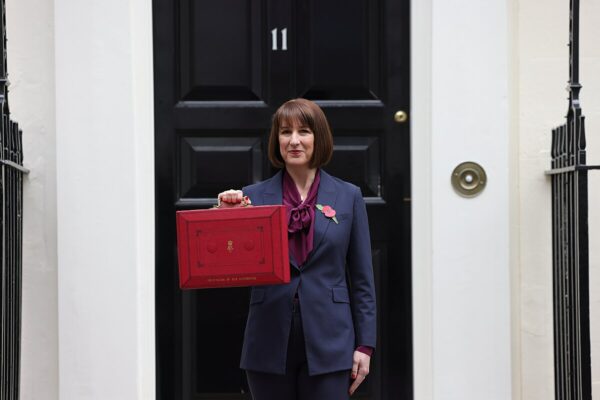This budget is a devastating blow for independent heritage
The government has chosen serials over cereals. It needs to realise how harmful this misstep will be, and reverse its plans, says our Director General, Ben Cowell.

Chancellor Rachel Reeves delivers the Autumn Budget 2024. Picture by Kirsty O’Connor / Treasury. Cr
We can’t say that we weren’t warned. October’s budget came after months of speculation, when increases in inheritance tax were floated as one of the options for a government that has emphasised repeatedly the financial ‘black hole’ left by its predecessors.
Nevertheless, it still came as a shock when the chancellor announced that there would be a cap of £1 million on claims for business property relief and agricultural property relief on estates. For everything above that £1 million-mark, inheritance tax would apply at 20%, half the normal rate.
Even at the 20% rate, the withdrawal of 100% relief is a cruel blow for any estate that has built its tax planning around an assumption that full relief would be available. Estates that have diversified into new business ventures, with the expectation of this enabling the enterprise to pass smoothly to the next generation, will now need to re-think.
Heritage businesses are unlike other businesses. At their heart is a set of assets – a house, its contents, its grounds – unique to that place, and which are difficult to separate and divide without diminishing the quality and significance of those assets that remain. In any other business context, capital assets depreciate over time, but for assets held within heritage businesses the reverse tends to be the case (they appreciate, as their scarcity value grows).
The imposition of inheritance tax on these assets is directly anti-business in its effect. The chancellor’s intention was seemingly to ensure that the richest in society – particularly those who have bought land in recent years as a shield against inheritance tax – paid their fair share. The effect of the change, however, is to penalise those whose assets have been passed down through the family line over many centuries. Many smaller farmers are now extremely worried about the future of their family businesses and livelihoods.
Other inheritance tax options remained unchanged by the Budget, notably the rules around potentially exempt transfers and the system of heritage exemptions. The Treasury may counter, therefore, that the continuation of such reliefs makes the impact of the change to business and agricultural property relief more tolerable. A further consultation is promised on how the change will affect properties that are already held in the form of trusts and are thus subject to a 6% decennial charge.
Without doubt, the change to business and agricultural property relief creates business uncertainty for custodians of historic estates. It means that many estates will now be reconsidering their options. They could decide that their business is no longer viable, if it will eventually be subject to an inheritance tax charge of this magnitude.
We have already noticed an uptick in the number of historic estates coming to market recently. If this trend gathers pace, it could mean that historic estates formerly open to public access are acquired by new owners interested in the house and its grounds purely as a private concern. As a result, the public benefit of houses being open to all is lost, with a consequent reduction in jobs.
Other business sectors received additional support in the chancellor’s statement. For example, the chancellor confirmed that tax credits for the creative industries – film and TV productions, video games, museum exhibitions – would continue to apply. These creative industries reliefs cost more than £2 billion every year, which is more than four times the amount (£520 million) that the cap on access to business and agricultural property relief is predicted to generate annually (by 2027). The government has chosen serials over cereals.
It is hard to interpret a budget that pours subsidies into the creative industries while increasing the tax take on rural businesses as anything other than wilful discrimination. Our rural economy is already being held back by a failure to invest, and it seems our new government will follow suit. Rural estates seem to present as a target for additional taxation, while the makers of Netflix dramas are entrepreneurs who deserve a helping hand. It’s a strange situation to be in, when so much filming takes place at Historic Houses member properties (Disney+’s recent Rivals being a case in point).
The government has disregarded the evidence that Historic Houses member properties sustain over 32,000 full-time equivalent jobs, that they help to generate over £1 billion in consumer spending, and that they are responsible for around a third of all heritage tourism.
At the same time, the budget created more costs for businesses all over the country. Employers’ national insurance was increased to 15%. The national minimum wage for 18–20-year-olds was increased by over 16% (to £10 an hour). This will have a disproportionate impact on the tourism and hospitality industries. From a government that claims to be promoting economic growth and creating new conditions for investment, it can’t help but look like a series of profoundly anti-small-business measures.
The saving grace is that the change to business and agricultural property relief comes in from April 2026. Members now have just over a year to devise new plans, therefore. The chorus of opposition to the move could also force the government to think again. Perhaps the £1 million cap can be re-set at a higher value, given the damage that the move will cause to relatively small family farms when it is set at the proposed rate.
We have registered our discontent with the budget and highlighted these risks and concerns to ministers and civil servants. We will continue to make our case, and work with others of the same mind, in the hope that the government will realise the extent of its misstep.
